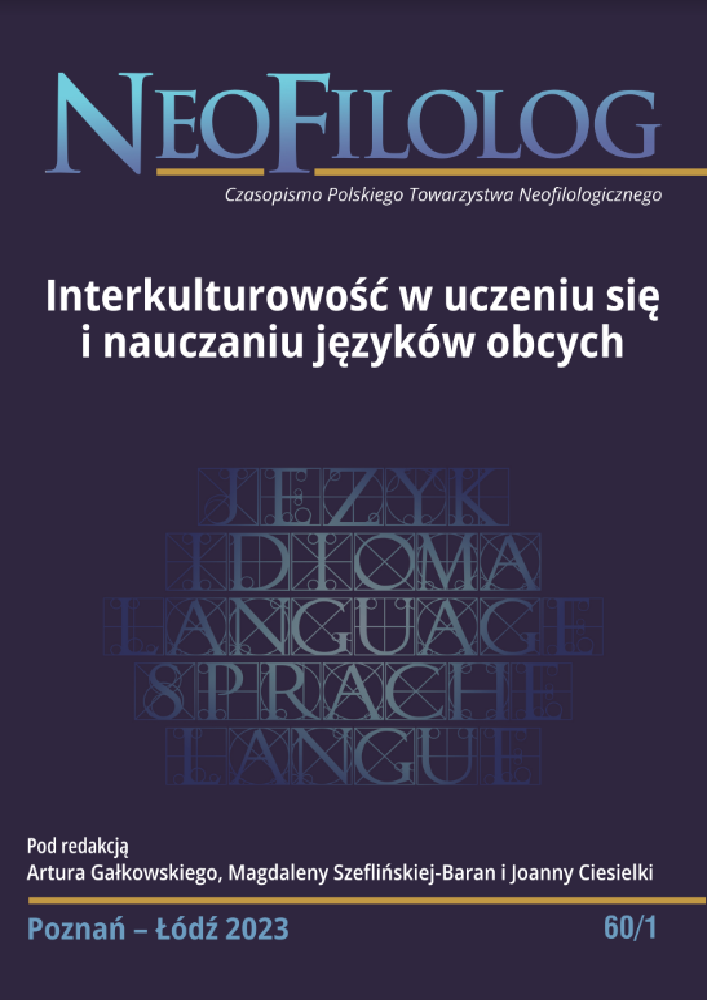Abstract
Intercultural communicative competence in Russian word stress acquisition refers to effective and appropriate management of interaction in various conversational situations that require specific orthoepic habits in the area of contemporary Russian accentual system. Every natural communicative situation needs informal, spoken language rather that standard Russian taught in classroom environment. Therefore, contemporary spoken Russian with its accentual characteristics needs to be examined. The research conducted on the group of Russian, Belorussian and Ukrainian youtubers indicates that the analyzed speech contains some specific derivatives which are characteristic of colloquial Russian: semelfactive verbs and their past participle forms with stressed suffix -ну́(ть)/-ану́(ть), masculine derivatives with stressed suffix -о́с, neuter nouns with the suffix -ов(о)/-ев(о), masculine nouns with the stressed suffix -а́к/-я́к, -а́н/-я́н, -о́н, feminine nouns with an accented suffix -у́х(а)/-ю́х(а), deverbal nouns with suffix -ёж, diminutives with suffixes -чик, -у́шк(а)/-ю́шк(а), -а́шк(а)/-я́шк(а), relational adjectives with stressed suffix -о́в(ый). Furthermore, there is no significant difference between Ukrainian, Belorussian and Russian analyzed material in terms of accentuation apart from one tendency, which does not seem to appear in Russians’ speech. Ukrainians and Belorussians tend to stress root in short verbs of past tense feminine forms.
References
Bartoszewicz A. (1987), Zagadnienia ewolucji współczesnego języka rosyjskiego. Warszawa: PWN.
Byram M. (2002), The Routledge encyclopedia of language teaching and learning. London: Routledge. DOI: https://doi.org/10.4324/9780203219300
Council of Europe: Coste D. i in. (2003), Europejski system opisu kształcenia językowego: uczenie się, nauczanie, ocenianie. Warszawa: CODN.
Efremova T.F. (2000), Novyj slovarʹ russkogo âzyka. Tolkovo-slovoobrazovatelʹnyj. Moskva: Russkij âzyk.
Efremova T.F. (2010), Orfografičeskij, slovoobrazovatelʹnyj, morfemnyj slovari russkogo âzyka. Moskva: Astrelʹ.
Fantini A.E. (2012), Language: an essential component of intercultural communicative competence, (w:) Jackson J. (red.), The Routledge Handbook of Language and Intercultural Communication. London-New York: Routledge, s. 263-278.
Fedânina N.A. (1976), Udarenie v sovremennom russkom âzyke. Moskva: Russkij Âzyk.
Filin F.P. (1973), O strukture sovremennogo russkogo literaturnogo âzyka. „Voprosy âzykoznaniâ”, nr 2, s. 3-12.
Kalenčuk M.L., Kasatkin L.L., Kasatkina R.F. (2017), Bolʹšoj orfoèpičeskij slovarʹ russkogo âzyka. Literaturnoe proiznošenie i udarenie načala XXI veka: norma i ee varianty. Moskva: Ast-Press.
Kapanadze P.A. (1984), Sovremennoe gorodskoe prostorečie i literaturnyj âzyk, (w:) Zemskaâ E.A., Šmelev D.N. (red.), Gorodskoe prostorečie. Problemy izučeniâ, Moskva: Nauka, s. 5-12.
Karaulov Û.N. (red.) (1997), Russkij âzyk. Ènciklopediâ. Moskva: Drofa.
Kiseleva L.A. (2009), Gorodskoe prostorečie. 25 let spustâ. „Journal of Siberian Federal University. Humanities & Social Sciences. Supplement”, nr 2, s. 68-77.
Koriakowcewa E. (2014), Słowotwórcze zasoby nowych stylów funkcjonalnych w językach słowiańskich. „LingVaria”, nr IX, s. 9-33. DOI: https://doi.org/10.12797/LV.09.2014.17.01
Kudinova T.A. (2009), Prostorečie kak lingvističeskij fenomen: dinamika ponâtiâ. „Naučnaâ myslʹ Kavkaza”, nr 4, s. 135-138.
Olechnowicz M. (1974), Teoretyczne zasady dystrybucji rosyjskiego akcentu wyrazowego. Wrocław: Zakład Narodowy im. Ossolińskich.
Valgina N.S. (2003), Aktivnye processy v sovremennom russkom âzyke. Moskva: Logos.
Warchala J. (2003), Kategoria potoczności w języku. Katowice: Wydawnictwo Uniwersytetu Śląskiego.
Zaliznâk A.A. (2008), Grammatičeskij slovarʹ russkogo âzyka. Moskva: Ast-Press.
Zaliznâk A.A. (2010), Trudy po akcentologii. Moskva: Âzyki Slavânskih Kulʹtur.
License
Copyright (c) 2023 Joanna Woch

This work is licensed under a Creative Commons Attribution-NoDerivatives 4.0 International License.
Authors
Authors of texts accepted for publication in Neofilolog are required to complete, sign and return to the Editorial team’s office the Agreement for granting a royalty-free license to works with a commitment to grant a CC sub-license.
Under the agreement, the authors of the texts published in Neofilolog grant Adam Mickiewicz University in Poznań a non-exclusive, royalty-free license and authorize the use of Attribution-NoDerivatives 4.0 International (CC BY-ND 4.0) Creative Commons sub-license.
The authors retain the right to the free disposal of the work.
Users
Interested Internet users are entitled to use works that have been published in Neofilolog since 2017, under the following conditions:
▪ attribution – obligation to provide, together with the distributed work, information about the authorship, title, source (link to the original work, DOI) and the license itself.
▪ no derivatives – the work must be preserved in its original form. Without the author's consent, it is not possible to distribute the modified work in the form of translations, publications, etc.
Copyrights are reserved for all texts published since 2017.
Miscellaneous
Adam Mickiewicz University in Poznań retains the property right as a whole (layout, graphic form, title, cover design, logo etc.).

